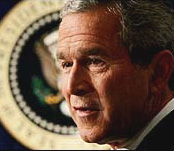|
 |
| President Bush has a stronger mandate for his
second term (Agencies) |
US
President George W Bush has been setting out the agenda for his second
term, vowing to reach out to allies while continuing the war on terror.
He told reporters it was a conflict in which every "civilised nation"
and every American had a stake.
He also spoke of the need for Middle East peace and said his
administration would "achieve our objectives" in Iraq.
The president was heading to his Camp David retreat later on Thursday
to consider changes to his administration.
The rare news conference came after Mr Bush held his first cabinet
meeting for three months, and probably the last such meeting until his new
term starts in January.
There has been much speculation about Mr Bush's
forthcoming reshuffle ,
but the president said he had not yet made any decisions.
"There will be some changes. I don't know what they will be," he said.
He acknowledged disagreements over the invasion of Iraq and said he
would reach out to other countries and organisations such as the European
Union and Nato.
"Every civilised country also has a stake in the outcome of this war,"
he said.
"Whatever our past disagreements, we share a common enemy. And we have
common duties to protect our peoples."
In an allusion to US allies, such as France and Germany, who opposed
the invasion of Iraq, Mr Bush said he had made some "hard decisions" to
protect Americans.
"I understand that certain capitals in certain countries, those
decisions were not popular," he said.
But he did not signal any changes in foreign policy.
When asked whether he agreed with UK Prime Minister Tony Blair that
revitalising the Middle East peace process was the most pressing issue
facing the world, the president said:
"I agree with him that the Middle East peace is a very important part
of a peaceful world. My hope is that we'll make good progress."
Wrongly informed by a reporter that Palestinian leader Yasser Arafat
had died, Mr Bush said: "My first reaction is, God bless his soul.
"And my second reaction is that we will continue to work for a free
Palestinian state that's at peace with Israel."
The president won 51% of the popular vote in Tuesday's vote, giving him
a stronger mandate than the election of 2000.
Mr Bush said the voters had "set the direction for the next four
years".
He said he wanted Congress to reform social security and the tax
system.
"I've earned capital in this election and I'm going to spend it," Mr
Bush said.
There have been reports that Attorney General John Ashcroft and
Homeland Security Secretary Tom Ridge both plan to resign for personal
reasons.
Defence Secretary Donald Rumsfeld
is among those who are unlikely to last the full term. He may stay
for another year or so if he wants to.
Secretary of State Colin Powell is expected to go, but not everyone is
convinced he wants to.
There is speculation he might be replaced by the recently appointed US
ambassador to the UN, John Danforth.
National security adviser Condoleezza Rice has said in the past that
she wants to return to her university career, but she is close to the
president and is thought by some to harbour presidential ambitions.
Vice-President Dick Cheney has suggested the administration now has a
mandate for a range of conservative social and economic policies.
These are likely to include issues ranging from tax reform to abortion
and same-sex marriage.
President Bush will get the chance to appoint conservative justices to
the Supreme Court if seats become vacant, which could have an impact far
beyond his presidency.
The powerful nine-member court is able to take final decisions on
issues ranging from the result of a presidential election to a woman's
right to have an abortion.
(Agencies) | 